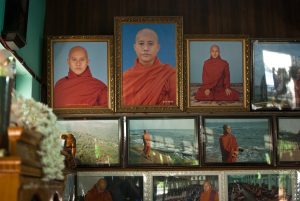On January 3, Myanmar’s military government granted the nationalist Buddhist monk Wirathu a national award for his “service” to the country. According to a report from AFP, which cited the military’s information team, junta chief Senior Gen. Min Aung Hlaing granted the Buddhist firebrand the title of “Thiri Pyanchi,” an award recognizing “outstanding work for the good of the Union of Myanmar.”
Wirathu, who has scarcely been seen in public since his release from prison in September 2021, was just one of hundreds of people who were granted awards and titles on the occasion of the 75th anniversary of Myanmar’s independence from Great Britain, which fell on January 4.
But he was one of the more curious inclusions. During the early stages of Myanmar’s political opening, the Mandalay-based monk became infamous for peddling an extreme form of ethnic Burman chauvinism and Buddhist nationalism, and whipping up sentiment against the country’s various Muslim communities. He was also the primary spokesperson for the 969 movement, which among other things encouraged Buddhists to boycott Muslim-owned businesses.
Wirathu’s rhetoric contributed considerably to an intensification of sectarian tensions in many parts of the country and the military’s savage assaults against the Muslim Rohingya communities of Rakhine State in August 2017.
However, Wirathu fell from grace somewhat after Aung San Suu Kyi’s National League for Democracy (NLD) took office in 2016 and was imprisoned shortly before the NLD’s lopsided victory at the November 2020 election, on charges that he tried to stir up disaffection against the government.
Whether the granting of the award is anything more than a routine development is unclear. Wirathu’s relationship with the Myanmar military is complex. At the 2015 election, he campaigned actively against the NLD and for the military-backed Union Solidarity and Development Party (USDP); indeed, he once called on the people “to worship the USDP as if they were worshipping Buddha.”
In September 2021, after it overthrew the NLD government in a coup, the military authorities released Wirathu from prison. As the Democratic Voice of Burma noted at the time, he was just one of a number of notorious nationalist figures who were released from custody in the months following the military’s seizure of power. The junta nonetheless kept Wirathu in custody for a full seven months before releasing him, a delay that reportedly frustrated the monk and led one observer to opine that he was “no longer useful” to the military.
Wirathu has maintained a low profile since. According to local media reports, he surfaced in October of last year, when he held a sermon to mark the Buddhist Kathina festival in Nattalin township, Bago Region, in which he discussed the principles of the 969 movement. He reportedly arrived under police and military guard.
Given its current struggle to put down the nationwide resistance to its rule, it is no surprise to find the coup government seeking allies wherever it can find them. Perhaps it hopes for Wirathu’s help in supporting its chosen candidates in the stage-managed elections that it seems set on holding later this year. But whether the “Buddhist bin Laden,” as TIME magazine once hyperbolically termed him, is “mobilized” to serve military government in any more substantial and long-term capacity remains to be seen.

































